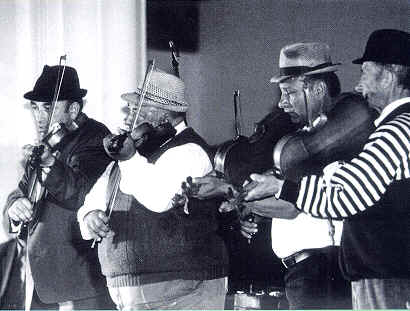| Back Evening of Budapest XI. Sztregova str. 3. June 25., 1999. |
| Back Evening of Budapest XI. Sztregova str. 3. June 25., 1999. |
 |
On 25 June, two authentic groups will be performing: the Budapest Dance Group and the Tükrös group. The Mezőzáhi Orchestra is a traditional Gypsy string band, eminent representatives of Transylvanian and Mezőség music, whose repertoire includes Romanian, Hungarian and Gypsy folk music. The Alsókálosa Band (Upper Hungary), by contrast, is the village version of urban Gypsy bands playing old verbunko (recruiting) music. Their instrumental compilation includes all that brought the city gypsy bands of the time such success in the West, but they still maintain the fresh naiveté of peasant music. The Budapest Dance Group, led by Zoltán Zsuráfszki, became 40 years old last year. They will bring to the evening an aspect of Hungarian folk dance which has the strength of revival, but draws deeply on its roots. The Tükrös group is one of the young combinations brought up in the Dance House movement. Their forte is in the vitality they bring to Hungarian instrumental folk music. |
Fonó has
been running since 1995, providing space to various kinds of music. Eminent musicians give
concerts mainly of folk music, contemporary jazz and world music every week in Fonó. |